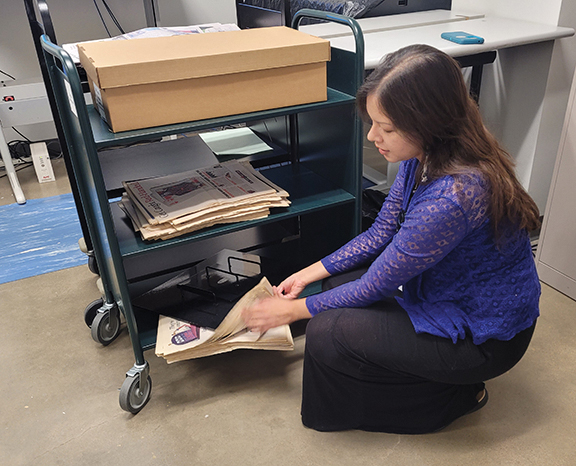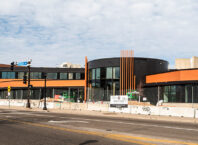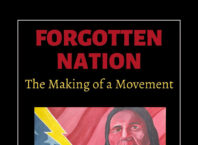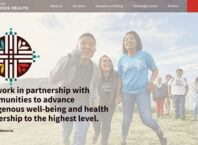
By Eileen Bass/MHS
My name is Eileen Bass and I am a member of the Sac & Fox Nation of OK, with additional family ties to Standing Rock and Mvskoke Nation communities. This past summer, I was accepted into the Minnesota Historical Society’s Native American Undergraduate Museum Fellowship (NAUMF) program. Six fellows would complete internships during NAUMF.
My work involved the digitization of tribal newspapers from Ojibwe communities. My in-person internship took place in the Library & Archives Department at the History Center. The newspapers that I worked with were primarily written by and for Ojibwe communities. Speaking of Ourselves = Ni-mi-kwa-zoo-min is the tribal newspaper from the Cass Lake reservation in Minnesota and the Lac du Flambeau tribal newspaper originates from the Lac du Flambeau band of Ojibwe in Wisconsin.
Several MNHS staff, Minnesota Indian Women’s Resource Center (MIWRC), and American Indian Learning Resource Center (AILRC) members took early steps to make digitization possible. In the spring of 2019, a meeting between MNHS, MIWRC and Franklin Library staff was held to discuss Ojibwe tribal newspapers. Anne Levin, the Collections Digitization Manager of MNHS, recalls that “it was a great opportunity to learn more about the MIWRC and their newspaper collection.”
In 2016, MNHS first learned about the AILRC tribal newspaper collection from the University of Minnesota Duluth (UMD) Library. After consulting with the AILRC, UMD contacted MNHS about transferring a set of digital files for tribal newspapers. Matthew Rosendahl, the Library Director of UMD shared the following, “The library partnered with the AILRC to digitize the newspapers. The UMD library had digitized the newspapers and put them in our campus institutional repository, where they were available for approximately four years before we merged with the University of Minnesota institutional repository which has a requirement that all deposited items must be created by a part of the University. As such, we needed to find another place to make these digitized newspapers digitally preserved and freely available. Fortunately the Newspaper Hub was willing to do that.” The AILRC would also donate print newspapers from their collection to MNHS, with the help of the UMD Library.
Between 2019 and 2022, issues of both Speaking of Ourselves and Lac du Flambeau News (a tribal newspaper) were donated to the Minnesota Historical Society by MIWRC and AILRC. These complemented issues previously deposited by the tribal publishers to MNHS and microfilmed for preservation and access.
Regan Kluver and Rita Walaszek-Arndt of the Native American Initiatives department of MNHS shared that the Library & Archives Department went to the team about digitizing the tribal newspapers. Kluver said, “the stars aligned.” She followed up with Anne Levin about a project for a Native fellow to complete with the digitization collections team.
“That whole team was very excited and would follow up with me before I could follow up with them about getting a Native fellow involved in this project because they knew that the work would be done regardless, but that it was going to be ten times more impactful for a Native person to be caring for these items and to digitize them rather than someone else who appreciates them but does not get the full grasp of what it is that they’re handling.”
MNHS has permission from the Minnesota Chippewa Tribe for Speaking of Ourselves to be available for online viewing from anywhere, so long as the reader has access to the Minnesota Digital Newspaper Hub for online collections. Currently, digitized issues of the Lac du Flambeau News can only be viewed in the History Center’s Gale Family Library.
Randy Vickers, of the MIWRC, spoke of the importance of cultural relevance that the Lac du Flambeau News provided when he first saw them. “There was a big huge box full of papers that were in good condition and then I was like, “my god, I can’t throw these out.
Ashley put them all together and that was pretty great. I’m very glad that stuff is not lost, it’s very important that we keep information alive. It’s a way to mitigate the effects of genocide or ethnocide. Let the cultures exist and continue existing and growing.”
“Digitization is important today for both access and preservation, which are core goals for MNHS and the newspaper collection. Digitization is the present and future of museum, library, archival collections to enable access” said Anne Levin.
Walaszek-Arndt shared that people may not know that tribal communities get their primary information from physically printed tribal newspapers. “Because they’re physical papers, we need to digitize that information because it’s still being greatly used among our tribal communities. We need to preserve what’s in there because it’s really pertinent to what’s happening at those specific communities today.”
Throughout my internship, I was impressed with the coverage of many local issues within the Lac du Flambeau and Cass Lake reservations, along with larger topics across Native country, including sovereignty, environmental rights, music, film, and politics. My internship involved working on the digital collection of Speaking of Ourselves, which had been digitized with MNHS microfilm from its monthly publication in the late 1970s and early 80s.
The digitization process for inclusion into the Newspaper Hub involved learning software that would utilize search engine optimization, cropping, page sequencing, and zoning for keywords. The box of monthly physical copies of Lac du Flambeau News had been published in the 1990s. This work involved ironing down creases, scanning the flattened pages, and then doing final quality checks of the downloaded images.
I look forward to more digitization work being done at the History Center for the purposes of research, historic preservation, and culturally significant accounts of our strong relatives.
Questions about the Digital Newspaper Hub can be sent to newspapers@mnhs.org, see https://www.mnhs.org/newspapers/hub.






